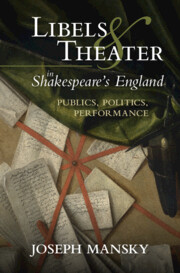Book contents
- Libels and Theater in Shakespeare’s England
- Libels and Theater in Shakespeare’s England
- Copyright page
- Dedication
- Contents
- Acknowledgments
- Abbreviations
- Introduction Seeds of Sedition
- Part I The Scene of Libel
- Part II Libels on the Elizabethan Stage
- Chapter 3 Libels Supplicatory: Shakespeare and Peele’s Titus Andronicus
- Chapter 4 Libel, Equity, and Law in Sir Thomas More
- Chapter 5 Jane Shore’s Public: Pity and Politics in Heywood’s Edward IV
- Chapter 6 Turning Plays into Libels: Satire and Sedition in Jonson’s Poetaster
- Epilogue Staging Libel in Early Stuart England
- Bibliography
- Index
Chapter 4 - Libel, Equity, and Law in Sir Thomas More
from Part II - Libels on the Elizabethan Stage
Published online by Cambridge University Press: 05 October 2023
- Libels and Theater in Shakespeare’s England
- Libels and Theater in Shakespeare’s England
- Copyright page
- Dedication
- Contents
- Acknowledgments
- Abbreviations
- Introduction Seeds of Sedition
- Part I The Scene of Libel
- Part II Libels on the Elizabethan Stage
- Chapter 3 Libels Supplicatory: Shakespeare and Peele’s Titus Andronicus
- Chapter 4 Libel, Equity, and Law in Sir Thomas More
- Chapter 5 Jane Shore’s Public: Pity and Politics in Heywood’s Edward IV
- Chapter 6 Turning Plays into Libels: Satire and Sedition in Jonson’s Poetaster
- Epilogue Staging Libel in Early Stuart England
- Bibliography
- Index
Summary
In the spring of 1593, a spate of viciously xenophobic libels appeared throughout London. The most notorious of these, the so-called Dutch Church libel, landed Thomas Kyd and Christopher Marlowe in some trouble, possibly due to its prominent allusions to Marlowe’s plays. This chapter argues that the collaborative, censored playscript Sir Thomas More reprises the incendiary confluence of libel, xenophobia, and drama that took place in 1593. The play’s opening scenes dramatize the anti-immigrant Evil May Day riot of 1517 with an eye to the 1590s, showing the strangers’ crimes and the violent resistance of London’s citizens. The citizens take their grievances public once all legal avenues for redress have failed. Yet libel and riot are not the only extralegal recourses in the play. The latter two-thirds of Sir Thomas More track the rise and fall of its titular character, who himself repeatedly confronts the limits of the law. Thomas More’s career extends the initial dramatization of libel into an extended meditation on the remedies available to any subject afflicted by unjust law, from bills and libels to riot to the vexed administration of equity and the vagaries of conscience.
Keywords
- Type
- Chapter
- Information
- Libels and Theater in Shakespeare's EnglandPublics, Politics, Performance, pp. 115 - 143Publisher: Cambridge University PressPrint publication year: 2023

